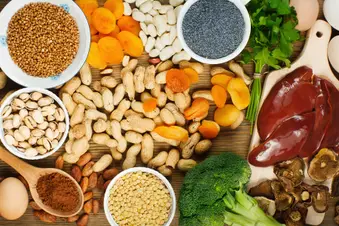
You’ve got low iron and need to bring your levels up. Depending on why your iron is low and how well your body can take it in, there may be several ways you can bring it up.
If your body is able to absorb iron normally, your doctor might recommend that you change the way you eat to include more iron. If diet alone doesn’t do the trick, you may need an iron supplement. If you have trouble bringing your iron up to a healthy level with these DIY methods, your doctor may prescribe medications or blood transfusions.
Diet
Iron you get from food comes in two forms: heme and non-heme. Your body absorbs heme iron two to three times better than non-heme iron.
The best source of heme iron is animal protein. You get that from meat and seafood, including:
- Oysters, clams, mussels
- Beef or chicken liver
- Organ meats
- Canned sardines
- Beef
- Poultry, such as chicken or turkey
- Canned light tuna
You can get non-heme iron from plant-based foods such as:
- Beans and lentils
- Tofu
- Baked potatoes
- Cashews
- Dark leafy greens like spinach and broccoli
- Breakfast cereals with added iron
- Whole-grain breads with added iron
You can boost your iron intake from plant sources by adding vitamin C to your meals as you eat these foods. Vitamin C helps your body absorb iron. Try adding citrus fruits, bell peppers, tomatoes, or strawberries to your leafy green salad.
Supplements
In addition to a more iron-rich diet, you may need over-the-counter iron supplements to build up iron in your blood. Your doctor will help decide how much you should take. To give your supplements the best shot at working, you’ll need to follow a couple of guidelines:
Take them on an empty stomach. Your gut can best absorb an iron supplement when it’s empty. If this causes you to have an upset stomach, it’s OK to take iron with food or right after a meal.
Don’t combine them with antacids. These medications keep your body from taking in iron, so space your supplement and antacid at least 2 to 4 hours apart.
Add vitamin C. Vitamin C boosts iron absorption, so a glass of orange juice or a vitamin C supplement will pair perfectly with your iron pill.
A note about iron supplements: Sometimes they back you up. Watch out for constipation, and ask your doctor whether you might need to add more fiber to your diet or a stool softener to ease your bowel movements.
You’ll also want to talk to your doctor if you take thyroid medication. Iron supplements can prevent your body from absorbing them.
Medications
If you're taking an iron supplement, eating good amounts of iron, and your levels are still low, your doctor may need to explore more to find out what’s causing your iron deficiency. Depending on the cause, you might need treatment with:
- Oral contraception. If a heavy period is causing your low iron, treatment with contraceptives may regulate it and help you build iron stores back.
- Antibiotics and antacids. Peptic ulcers can cause low iron. A course of antibiotics will treat this condition.
- IV iron infusions or blood transfusions. If you have severe iron-deficiency anemia, you may need these to get iron and hemoglobin back into your bloodstream quickly.
Risks of Too Much Iron
It’s not common to take in so much iron that it hurts you. Typically, your body self-regulates iron levels and stops absorbing it when you have enough. But it is possible to take in too much. This may happen if you take iron supplements when you don’t need them.
If you get too much iron, you might notice:
- Constipation
- Upset stomach
- Nausea, vomiting
- Abdominal pain
When Your Body Won’t Absorb Iron
Certain conditions, such as celiac disease, pancreatitis, pancreatic cancer, cystic fibrosis, inflammatory bowel disease, and chronic kidney disease, can keep you from absorbing iron through your gut. In these cases, you may need iron through an IV to add iron to your body.
Show Sources
SOURCES:
Academy of Nutrition and Dietetics: “Foods to Fight Iron Deficiency.”
Harvard T.H. Chan School of Public Health: “Iron.”
Mayo Clinic: “Iron Deficiency Anemia.”
Pakistan Journal of Medical Sciences: “Disorders associated with malabsorption of iron: A critical review.”
GI Society: “Iron Deficiency Anemia.
New England Journal of Medicine: “Iron May Reduce Thyroxine Absorption.”
American Family Physician: “Peptic Ulcer Disease.”